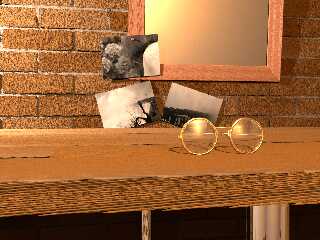|
 |
"19100" <nomail@nomail> wrote:
> "Bald Eagle" <cre### [at] netscape net> wrote:
> > "19100" <nomail@nomail> wrote:
> > > This scene is my first that's (mostly) based on real world measurements, I think
> > > I've read enough USBC specification documents to be certified or something.
> > >
> > > Grab the source files here:
> > > https://archive.org/download/19100-povray/king.zip
> >
> > That really came out very nice. :)
> >
> > The neon lights are very cool.
> > The alley's wood floor pattern could maybe benefit from some stretching in the
> > z-direction, maybe with a wee bit less turbulence?
> >
> > Not sure about the red cinder-block wall. Seems off somehow. Also too
> > CGI-perfect.
> >
> > The bowling ball in the foreground would benefit from a little bit of
> > fill-lighting, and the icing on the cake would be to add just a touch of
> > motion-blur.
> >
> > Maybe define a rolling function and make a few highly-transparent copies of the
> > ball that "roll into" the 3 balls in the render.
> >
> > You could also possibly make the far ball actually hit and have some of the pins
> > mid-tumble in the air.
> >
> > Great job - I'm sure it was a challenging exercise in measuring and modeling!
> >
> > - BW
>
> Thanks! Those are great notes to take into account for any future revisions.
> Looking at the bricks perhaps it's the lack of weathering that makes them seem
> off, maybe the scale too. The afterimages are a really good idea, 2.2 was before
> scripting but the SDL is easy to generate so both that and the pin physics are
> very doable. Getting the measurements was probably the most time consuming part
> of it all, finding the dimensions of a specific small detail is a real pain when
> there's so much SEO-optimized crap out there with the same handful of repeated
> information.
In my images with brick walls, I have started using iso-surfaces that use the
brick pigment-pattern to define the shape of the bricks and the mortar as
separate objects. I apply turbulence to the brick pattern to get less perfect
brick edges, and then also apply pigment patterns to the visible face of the
brick, (for me the Z-axis), to apply a texture to them. I then use some
techniques I found to vary the color/texture of the bricks so they vary rather
than having a uniform texture, but still preserving a single texture per brick.
I have attached an example. net> wrote:
> > "19100" <nomail@nomail> wrote:
> > > This scene is my first that's (mostly) based on real world measurements, I think
> > > I've read enough USBC specification documents to be certified or something.
> > >
> > > Grab the source files here:
> > > https://archive.org/download/19100-povray/king.zip
> >
> > That really came out very nice. :)
> >
> > The neon lights are very cool.
> > The alley's wood floor pattern could maybe benefit from some stretching in the
> > z-direction, maybe with a wee bit less turbulence?
> >
> > Not sure about the red cinder-block wall. Seems off somehow. Also too
> > CGI-perfect.
> >
> > The bowling ball in the foreground would benefit from a little bit of
> > fill-lighting, and the icing on the cake would be to add just a touch of
> > motion-blur.
> >
> > Maybe define a rolling function and make a few highly-transparent copies of the
> > ball that "roll into" the 3 balls in the render.
> >
> > You could also possibly make the far ball actually hit and have some of the pins
> > mid-tumble in the air.
> >
> > Great job - I'm sure it was a challenging exercise in measuring and modeling!
> >
> > - BW
>
> Thanks! Those are great notes to take into account for any future revisions.
> Looking at the bricks perhaps it's the lack of weathering that makes them seem
> off, maybe the scale too. The afterimages are a really good idea, 2.2 was before
> scripting but the SDL is easy to generate so both that and the pin physics are
> very doable. Getting the measurements was probably the most time consuming part
> of it all, finding the dimensions of a specific small detail is a real pain when
> there's so much SEO-optimized crap out there with the same handful of repeated
> information.
In my images with brick walls, I have started using iso-surfaces that use the
brick pigment-pattern to define the shape of the bricks and the mortar as
separate objects. I apply turbulence to the brick pattern to get less perfect
brick edges, and then also apply pigment patterns to the visible face of the
brick, (for me the Z-axis), to apply a texture to them. I then use some
techniques I found to vary the color/texture of the bricks so they vary rather
than having a uniform texture, but still preserving a single texture per brick.
I have attached an example.
Post a reply to this message
Attachments:
Download 'scene-1.3-2021-10-07.png' (1418 KB)
Preview of image 'scene-1.3-2021-10-07.png'

|
 |




![]()